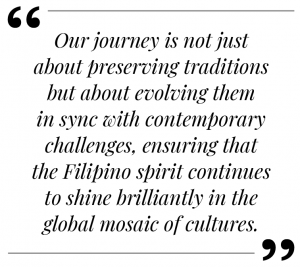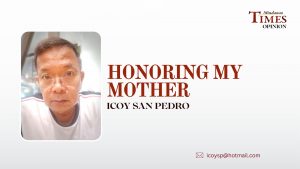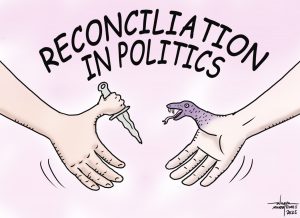By Herman M. Lagon
 IN THE intricate tapestry of national identities, the Filipino spirit stands out, intertwined with threads of resilience, community, and deeply ingrained values of family and Bayanihan. The Philippines, often seen as a resilient nation facing the storms of both nature and politics, is replete with narratives of hope, survival, and solidarity. Amidst this backdrop, let us delve into what it means to be a Filipino and how to be one with this identity.
IN THE intricate tapestry of national identities, the Filipino spirit stands out, intertwined with threads of resilience, community, and deeply ingrained values of family and Bayanihan. The Philippines, often seen as a resilient nation facing the storms of both nature and politics, is replete with narratives of hope, survival, and solidarity. Amidst this backdrop, let us delve into what it means to be a Filipino and how to be one with this identity.
Recently, the heartwarming saga of individuals such as Justin Brownlee, Kyle Jennermann, and Peter Leslie Wallace embracing Filipino citizenship has spotlighted the magnetic allure of the Filipino identity. Brownlee’s riveting basketball feats for Gilas Pilipinas and Barangay Ginebra, Jennermann’s YouTube channel “Becoming Filipino” celebrating the nation’s culture, and Wallace’s longstanding contributions to the Philippine business community reflect an embracing of Filipino spirit beyond birthright. These men, not originally Filipino by birth, chose to immerse themselves in the nation’s heart and soul, further underscoring that being Filipino goes beyond bloodline—a spirit, a commitment, an identity.
However, it is critical to move beyond the trope of “toxic resilience” in charting our national identity. Resilience should not mean passive acceptance of every adversity. An honorable Filipino life is not just about enduring hardships but leveraging them to catalyze social activism, a love for one’s country, and a commitment to social justice, which promotes the betterment of society. Filipinos are encouraged to strive for excellence, not just for themselves but for their community, recognizing and addressing societal issues in pursuit of justice, democracy, and human rights.
Jose Rizal, the nation’s iconic hero, once emphasized the importance of love for one’s country and education. He believed in the power of enlightening the Filipino soul to foster unity and progress. This form of heroism—rooted in education, understanding, and action—is what is needed. Embracing one’s Filipino identity is not just about commemorating past struggles, but about harnessing this historical energy to advocate for a just, inclusive, and prosperous society.
However, what does it mean to be truly Filipino? It is not solely about language, food, or festivities. Beyond these vibrant expressions of culture lies the essence—the innate ability to extend a hand to a neighbor in times of need, the shared joy in communal successes, and the collective strength in moments of adversity. These elements form the core of the Filipino psyche, shaped by a rich history of intercultural influences, adversities, and victories.
As we navigate an era of rapid change and global influences, it is paramount to cherish and uphold the essence of being Filipino. Our journey is not just about preserving traditions but about evolving them in sync with contemporary challenges, ensuring that the Filipino spirit continues to shine brilliantly in the global mosaic of cultures.
Living as a Filipino means actively engaging in one’s society, recognizing its strengths, addressing its challenges, and continuously nurturing its unique spirit. It is about forging ahead, fueled by the resilient spirit, unwavering sense of community, and the deep-rooted values that have defined the Filipino identity for centuries.






